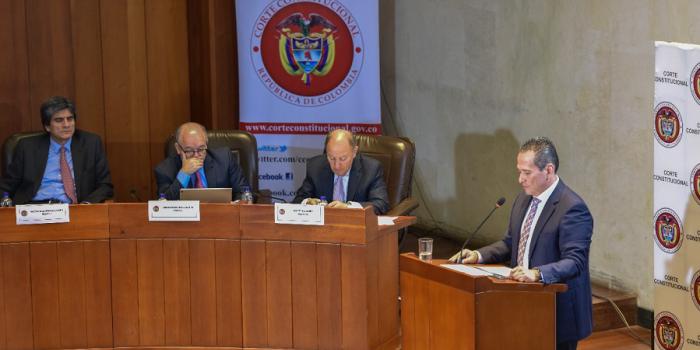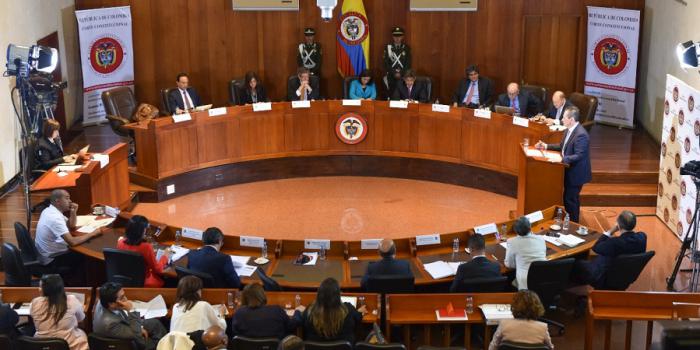
Less assistance and more social inclusion for victims
In a hearing before the Constitutional Court, victims and government officials spoke about the achievements and challenges of the public policy of victims. Among the achievements: substantial decrease in victims: 868,432 reported in 2002 and 82,580 in 2018. At the same time, coverage of education for minors increased considerably: from 877 thousand to 1 million 900 thousand.


"The national government is committed to making the integral attention and reparation to victims more efficient and effective and the new line of victim’s public policy aims to overcome the welfare approach, harmonizing it with the policy of social and productive inclusion". In this sense, the director (e) of Victims Unit, Ramón Rodríguez Andrade, was said to intervene in the public hearing convened by the Constitutional Court to monitor compliance with sentence T-025 of 2005.
This ruling declared the state of affairs unconstitutional on the rights of the population victim of forced displacement in the country and since then periodically the high court issues orders and monitors compliance with them.
The official insisted that President Iván Duque is interested in "making a judicious exercise of extension of Law 1448 of 2011 to comply with the victims." It will be done responsibly, he explained, taking into account that the procedure is done by the Congress of the Republic, and analyzing the availability of available resources and the appropriate time for the extension of the validity of Law, which will go until 2021.
On the purpose of Government, the director of Unit added: "What is sought is to harmonize the public policy for social and productive inclusion with the assistance measures of the victims policy. The recovery of their capacities as subjects of rights and agents of their own development will be promoted; and everything will have a differential and psychosocial approach".
Another challengethe Government will assume is a greater inter-institutional articulation among the entities that are part of the National System of Comprehensive Care and Reparation for Victims (Snariv), according to Ramón Rodríguez.
During the hearing, also the General Attorney of Nation, Fernando Carrillo, expressed himself in that sense: "The challenge is the articulation of territorial entities with the national because there are a number of parallels and it is necessary to see how to raise an instance of coordination".
About the explanations given to the magistrates of Court, the director of Unit emphasized: "We had the opportunity to explain to the Court that we have fulfilled all the attention in the immediacy that they have requested, so we have a coverage of 100% humanitarian emergencies; we have also shown that there is no under registration of victims, because the registration obeys a process established in the Law; In addition, we show the interventions we have made in health, education and income generation, and a general sweep was made in the repair of both individual and collective ".
Achievements and figures
Among the achievements that Ramón Rodríguez highlighted in his speech are:
- Today there is evidence of a gradual decrease in the number of victims: from 868,432 reported in 2002, it went to 82,580 in 2018.
- In 2018, 59.2% of victims' statements were received online, which has prevented them from expenses and displacements. This includes the connational victims living abroad.
- There are no lags in the valuation of the statements (to include or not the person in the Single Victim Registry). 68% of applications are assessed before the end of law. The others, full term.
- Of the 129,066 households identified with a minimum subsistence deprivation, 118,770 have been served with at least one turn of humanitarian attention, which reflects 92% of minimum subsistence aid placements.
- The education coverage of children and adolescents had a substantial increase. It went from 877,097 in 2012, to 1,914,151 in 2018.
- More than 58% of housing solutions that are delivered as a family housing subsidy are intended for displaced population. The displaced population is in the first place in the conformation of the listings of the Free Housing Program.
- 273,051 people have been accompanied in the framework of returns and relocations.
- Reparation and assistance resources have already been redirected to increase the rate of payment of compensation.
- During the year 2017, a total of 99,197 administrative compensations were made for forced displacement. So far in 2018, 83,471 compensations have been made, of which 95.5% have been granted to victims of forced displacement
- The policy of victims must be renewed, so the National Government, through the bases of National Development Plan, draws a new path to fulfill the Victims.
- The victims will be assisted in the social offer of the entire population, according to their condition of vulnerability, with explicit conditions of permanence and exit.
- In 2017 and 2018, the departments with the greatest number of beneficiaries of immediate humanitarian aid have been Chocó, Valle, Antioquia, Nariño and Norte de Santander.
- To date, the Victims Unit has 200 service centers in operation, 31 Centers for Social Inclusion and 169 Service Points. There are 5 applications for the formalization of points of service, approved for operation in 2018.
- New approach, which seeks that this process contributes to the overcoming of situation of vulnerability, to the strengthening of social capacities and articulates its vision to the local development of the territory
Representatives of victims from various regions of the country participated in the hearing, in addition to the Vice President of the Republic, Martha Lucía Ramírez, the Minister of Defense, Guillermo Botero, the Governor of Nariño, Camilo Romero, the Mayor of Medellín, Federico Gutiérrez , among other high-level national and regional officials.






